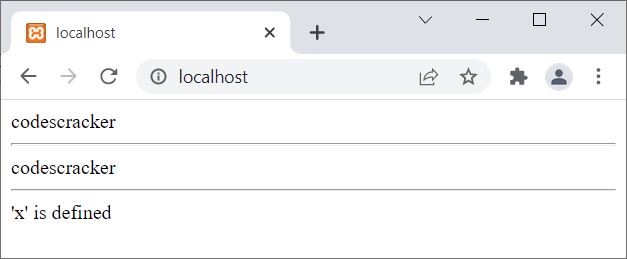- PHP Basics
- Learn PHP
- PHP Comments
- PHP Data Types
- PHP Variables
- PHP Operators
- PHP echo
- PHP print
- PHP echo vs. print
- PHP if else
- PHP switch
- PHP for Loop
- PHP while Loop
- PHP do...while Loop
- PHP foreach Loop
- PHP break and continue
- PHP exit()
- PHP exit() vs. break
- PHP isset()
- PHP Arrays
- PHP print_r()
- PHP unset()
- PHP Strings
- PHP Functions
- PHP File Handling
- PHP File Handling
- PHP Open File
- PHP Create a File
- PHP Write to File
- PHP Read File
- PHP feof()
- PHP fgetc()
- PHP fgets()
- PHP Close File
- PHP Delete File
- PHP Append to File
- PHP Copy File
- PHP file_get_contents()
- PHP file_put_contents()
- PHP file_exists()
- PHP filesize()
- PHP Rename File
- PHP fseek()
- PHP ftell()
- PHP rewind()
- PHP disk_free_space()
- PHP disk_total_space()
- PHP Create Directory
- PHP Remove Directory
- PHP Get Files/Directories
- PHP Get filename
- PHP Get Path
- PHP filemtime()
- PHP file()
- PHP include()
- PHP require()
- PHP include() vs. require()
- PHP mysqli Tutorial
- PHP mysqli Tutorial
- PHP and MySQL Setup
- PHP mysqli: Create Database
- PHP mysqli: Create Table
- PHP mysqli: Insert Record
- PHP mysqli: Update Record
- PHP mysqli: Fetch Record
- PHP mysqli: Delete Record
- PHP mysqli: SignUp Page
- PHP mysqli: LogIn Page
- PHP mysqli: Store User Data
- PHP mysqli Functions
- PHP mysqli_connect()
- PHP mysqli_close()
- PHP mysqli_connect_errno()
- PHP mysqli_connect_error()
- PHP mysqli_query()
- PHP mysqli_fetch_row()
- PHP mysqli_fetch_assoc()
- PHP mysqli_fetch_array()
- PHP mysqli_free_result()
- PHP mysqli_error()
- PHP mysqli_prepare()
- PHP mysqli_stmt_bind_param()
- PHP mysqli_stmt_execute()
- PHP mysqli_stmt_fetch()
- PHP mysqli_stmt_store_result()
- PHP mysqli_stmt_num_rows()
- PHP mysqli_stmt_bind_result()
- PHP mysqli_stmt_get_result()
- PHP mysqli_result class
- PHP mysqli_report()
- PHP error_reporting()
- PHP mysqli_real_escape_string()
- PHP htmlspecialchars()
- PHP Misc Topics
- PHP Object Oriented
- PHP new Keyword
- PHP header()
- PHP getallheaders()
- PHP Cookies
- PHP Sessions
- PHP Date and Time
- PHP GET vs. POST
- PHP File Upload
- PHP Image Processing
Difference between echo and print in PHP
This article is created to differentiate the two famous keywords or statements, which are:
To output data to the client or the browser in PHP, you can use the echo and print statements. Since they are both linguistic constructions and not functions, they can both be used without parentheses.
PHP echo vs. print
| echo | |
|---|---|
| Takes more than one argument | Takes only one argument |
| Does not return any value | Always returns 1 |
| Can not be used as an expression | Can be used as an expression |
| Little faster than print | Little slower than echo |
PHP echo vs. print example
Consider the following PHP code as an example of "echo vs. print."
<?php print "codescracker"; echo "<hr>"; echo "codes", "cracker"; echo "<hr>"; $x = 120; $x ? print "'x' is defined" : print "'x' is not defined"; ?>
The output of the above PHP example is:

The above PHP code consists of three statements that demonstrate the use of print and echo statements, along with a ternary operator for conditional output. Here's what each statement does:
print "codescracker";
This statement uses the print statement to output the string "codescracker" to the browser. The print statement is equivalent to the echo statement and can be used interchangeably.
echo "<hr>";
This statement uses the echo statement to output an HTML horizontal rule to the browser. The <hr> tag creates a horizontal line on the webpage.
echo "codes", "cracker";
This statement demonstrates that echo can take multiple parameters separated by commas, just like print. Here, it outputs the string "codescracker" to the browser, but with a subtle difference: the echo statement does not add any space or separator between the two strings, whereas print would add a space by default.
$x = 120; $x ? print "'x' is defined" : print "'x' is not defined";
This statement demonstrates the use of the ternary operator, a shorthand for an if-else statement. Here, it assigns the value 120 to the variable $x, and then checks whether $x evaluates to true or false. If $x is true, it prints the string "'x' is defined"; otherwise, it prints the string "'x' is not defined". Since 120 is a non-zero value and evaluates to true, the output of this statement will be: 'x' is defined.
Let me include one last example before closing the discussion on "echo vs. print."
<?php echo "Hello ", "World", "!<br>"; print "Hello World!<br>"; $string = "Hello World"; $result = print($string); echo "<br>Result of print statement: $result<br>"; ?>
Hello World! Hello World! Hello World Result of print statement: 1
« Previous Tutorial Next Tutorial »